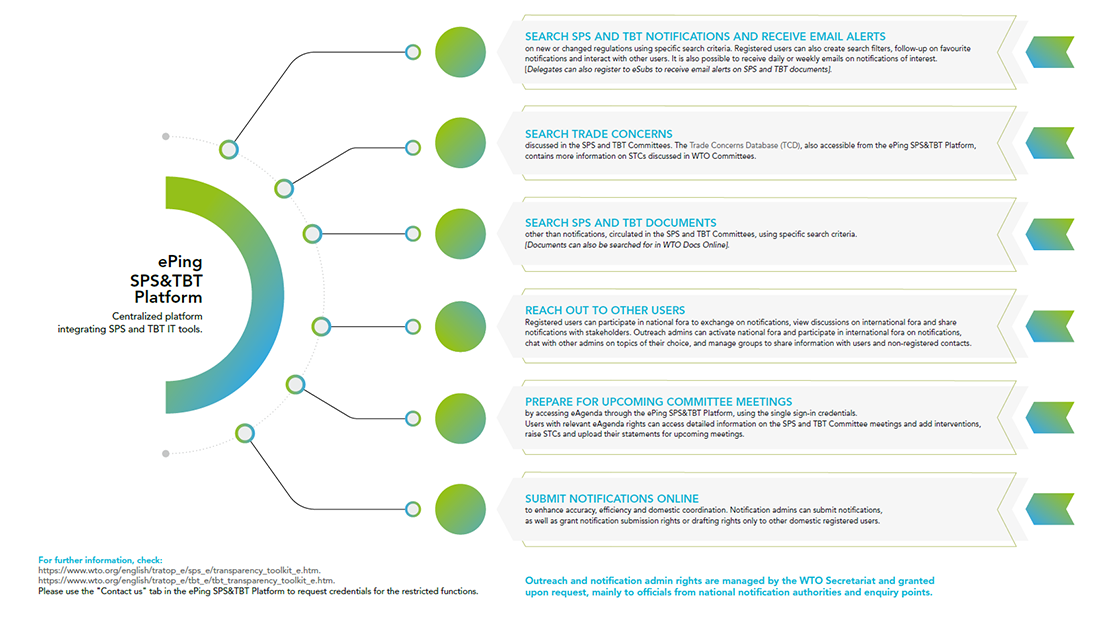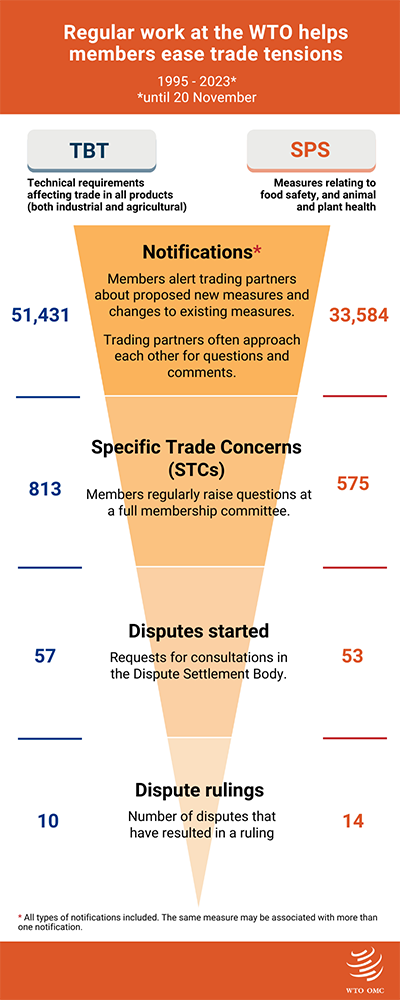Sanitary and phytosanitary measures
How do you ensure your country's consumers are being supplied with food that is safe to eat — “safe” by the standards you consider appropriate? And how can you ensure that strict health and safety regulations are not being used as an excuse for protecting domestic producers? The Agreement on the Application of Sanitary and Phytosanitary Measures sets out the basic rules on food safety and animal and plant health standards that governments are required to follow. Together with the Technical Barriers to Trade Agreement, it seeks to identify how to meet the need to apply standards while avoiding disguised protectionism.
- Search SPS & TBT notifications and trade concerns
- Submit notifications
- Register to receive email alerts
See Also
News
Introduction
The SPS Agreement allows WTO members to set their own standards on food safety and animal and plant health. But these standards must be based on science, applied only to the extent necessary to protect human, animal or plant life or health, and not arbitrarily or unjustifiably discriminate between countries where identical or similar conditions prevail.
Members are encouraged to use international standards, guidelines and recommendations but may adopt higher levels of protection if there is scientific justification for it, or if they are based on appropriate assessment of risks. The SPS Agreement allows countries to use different methods of control, inspection and approval procedures to verify compliance with adopted standards. Transparency regarding governments' SPS regulations is a key provision to avoid unnecessary barriers to trade.
More information about the SPS Agreement is available here. More on standards and safety can be found here. The SPS E-Learning Course is aimed at providing a deeper understanding of the SPS Agreement.
Committee on Sanitary and Phytosanitary Measures
The Committee on Sanitary and Phytosanitary Measures oversees the implementation of the Agreement on Sanitary and Phytosanitary Measures and provides a forum for members to raise and address related questions and concerns. The current chair is .
Full detailsMembers’ transparency toolkit
Transparency is a core principle in the WTO. According to Article 7 of the SPS Agreement, members shall notify changes in their sanitary or phytosanitary measures and provide information on their sanitary or phytosanitary measures in accordance with the provisions of Annex B. The Members' transparency toolkit contains all the relevant information for members to fulfil their transparency obligations regarding SPS measures.
Useful tools
The WTO Secretariat has developed a number of tools to assist members' transparency activities. All SPS online tools can be accessed from the ePing SPS&TBT Platform.

Disputes
The “WTO Analytical Index: Guide to WTO Law and Practice” is an article-by-article guide to the interpretation and application of the WTO agreements by WTO bodies. It covers the jurisprudence of the WTO Appellate Body, panels and arbitrators as well as related decisions and other significant actions taken by other relevant WTO bodies. Disputes relating to the SPS Agreement are available here.
Standard-setting bodies and other observer organizations
The SPS Agreement encourages members to base their sanitary and phytosanitary measures on international standards, guidelines or recommendations and to participate in their development and review. The Agreement also mandates the SPS Committee to develop a procedure to monitor the process of international harmonization and to coordinate with the relevant organizations.
Which are the relevant standard-setting organizations for the SPS Agreement?
- FAO/WHO Codex Alimentarius Commission (Codex): for food safety
- WOAH (founded as OIE): for animal health and zoonoses
- FAO International Plant Protection Convention (IPPC): for plant protection
Standards and Trade Development Facility (STDF)
The STDF is a joint initiative of the WTO, World Health Organization, World Bank, World Organization for Animal Health, and the UN Food and Agriculture Organization for enhancing developing countries’ capacity to meet SPS standards. Work includes sharing information on technical cooperation, and finance for projects. For more information, read the STDF's newsletter.


